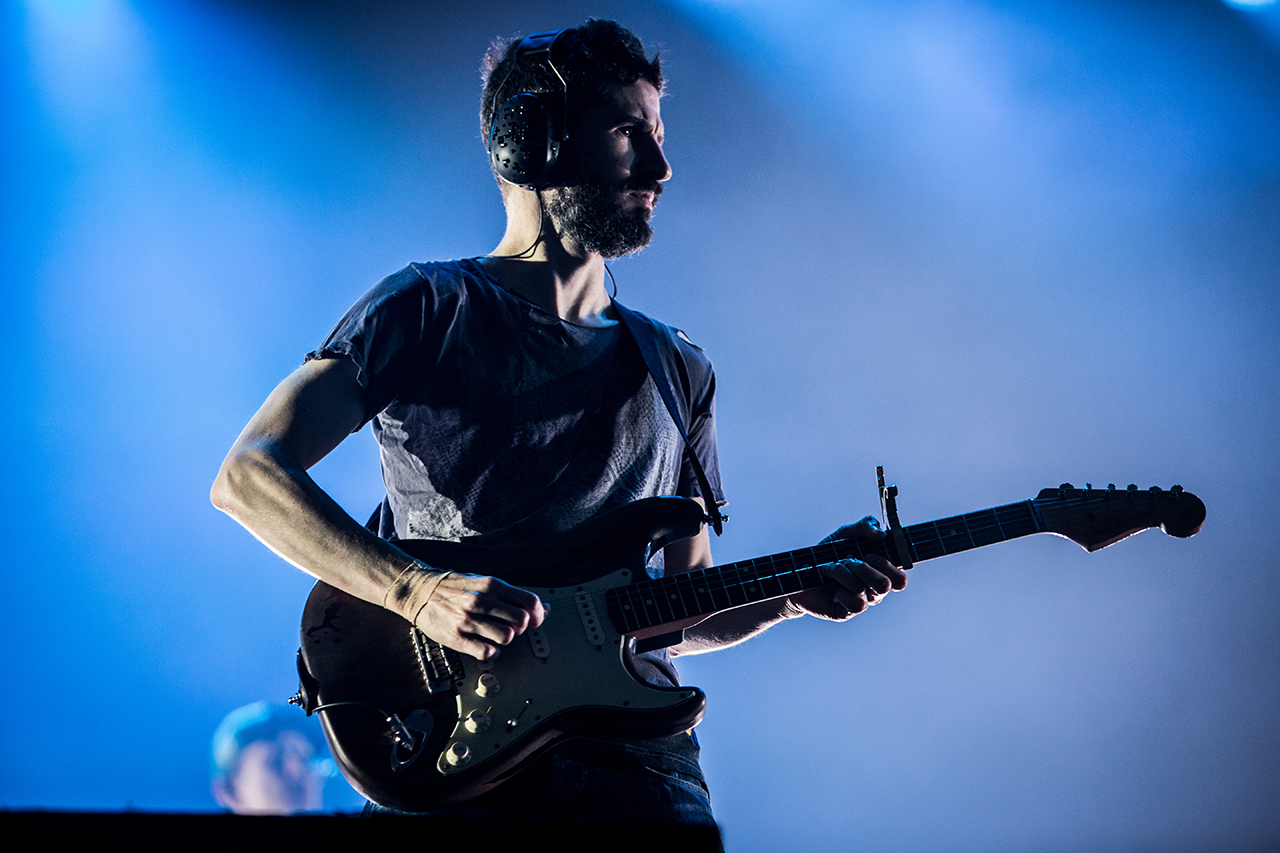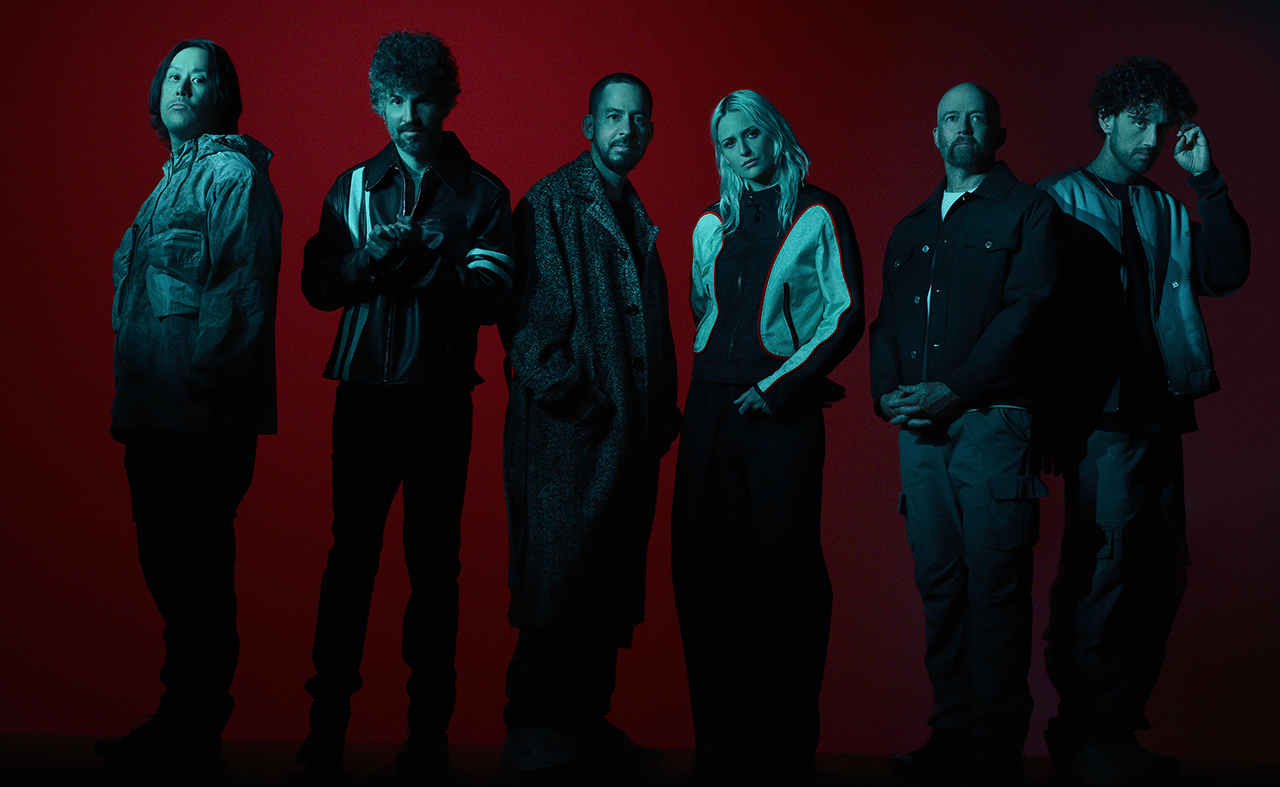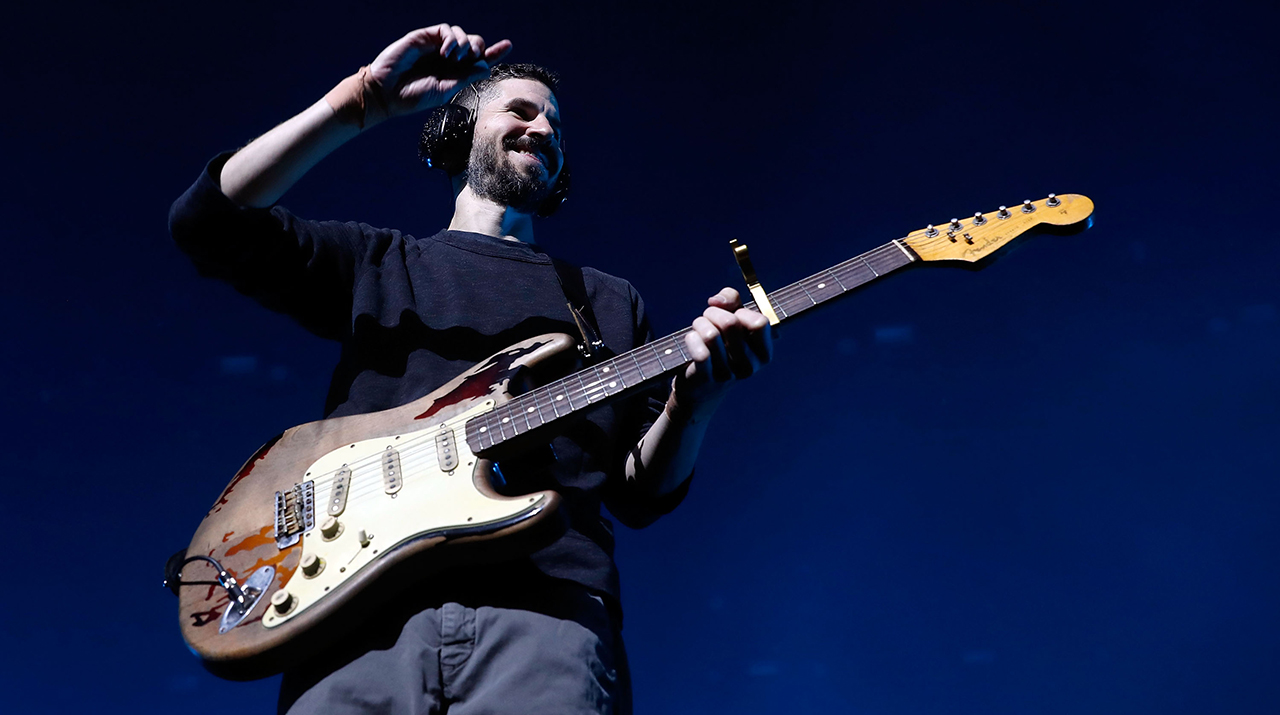“It’s been an incredibly intense year – even my closest friends didn’t know what we were doing. I can’t believe we were able to keep it a secret”: Brad Delson on Linkin Park’s miraculous comeback, why he quit touring, and how he trained his replacement
The co-founding guitarist has decided to focus on the studio side of the band, working with new vocalist Emily Armstrong’s energy, and balancing the PRS and Fender sounds that defined the nu-metal institution’s sound

Classic Linkin Park albums Hybrid Theory (2000), Meteora (2003) and Minutes to Midnight (2007) prove that Brad Delson was born to crush skulls.
“Since I was 12, if I went on a trip I had to bring my guitar with me, because I had to obsess,” he says. “I’d play for hours every single day.”
His nu-metal-meets-hip-hop-meets-alt-rock assault also powered Linkin Park’s A Thousand Suns (2010), Living Things (2012), The Hunting Party (2014) and One More Light (2017). But the band fell silent in July of that year in the wake of vocalist Chester Bennington’s death.
Most fans assumed the band would not return, but in September 2024 a rebooted version performed a livestreamed concert with new vocalist Emily Armstrong. The single The Emptiness Machine followed, and the announcement of a world tour supporting From Zero, Linkin Park's first record in seven years, and their first without Bennington.
Initial reaction was mixed – but it didn’t stop From Zero hitting No. 1 in 13 countries. Delson says he and his bandmates felt a connection with Armstrong from the jump. “She has a kind of energy that feels simpatico with the creativity that moves and drives us,” he explains. “Everything just fell into place very naturally. That’s essential to the creative process.”
“The main questions is, ‘Is this something that we love and can’t stop listening to?’ The impulse is to create some sound or idea that doesn’t yet exist and share it. If songs start sounding too repetitive I’ll lose interest. I want to experience an album three-dimensionally.”
Despite his integral role in recording the album, Delson chose to stay off the road, selecting veteran guitarist Alex Feder as his “world-traveler doppelganger.” And he knows he’s sent Linkin Park on their way with fiery new weaponry in their audio arsenal.
Get The Pick Newsletter
All the latest guitar news, interviews, lessons, reviews, deals and more, direct to your inbox!
“If nobody liked this record, I’d still be really stoked about it. But it’s performing in a way that doesn’t seem possible for a rock record now. There’s new people at the shows, mixed in with the long-term diehard fans. It’s an amazing time to celebrate and be grateful.”
Were you taken aback by the success of From Zero after being away for seven years?
“The hard thing about putting your heart and soul into making music, or any kind of art, is that you never know how it's going to be received. In the studio I try to block out any sense of expectation, and focus on making something we’re proud of that feels honest. So when you release the work into the world, you’re never sure how it’s going to resonate.”
How do you approach the creative process as a guitarist?
“Guitar has always been my main instrument, but I play a lot of piano now because it’s more unfamiliar to me. I still play guitar a lot, but I think about the songs from the point of view of a songwriter – I don't think about it as a guitar player.
“The vocals really drive the creative process. Sometimes, we start with the track – that was the Hybrid Theory, Meteora way. The way Rick Rubin trained us was to get to the vocal as quickly as possible.
“Then we move back and forth fluidly in those directions. In my mind, the track should be compelling, even with no vocals. However, we’re writing songs, not instrumentals. Having that vocal talent between Mike Shinoda and Emily – and their interplay – is essential.”
What makes Emily the right person for Linkin Park?
“The chemistry: there’s something about her voice and her energy that just feels like Linkin Park energy. The nice thing about our two vocalists is that they’re each really dynamic. Part of the band’s identity is exploring the space between genres and juxtaposition. If you don’t have vocalists who can cover every genre, the band’s raison d’etre would be stymied.

“We’ve always had an embarrassment of riches in terms of the versatility of our vocal talent. You really hear on this album – each song is different; even though it’s like one complete thought, each song is distinct from the other and takes you on a different journey.”
You chose Alex Feder as your touring replacement. What went into that decision?
“Alex is just so good-looking that the world could not resist him! It’s just a great friendship. He’s an amazing musician and a strong live player. I think he brings a lot to the show – and I’m really proud of the show.
“Even though I’m not onstage, I put a lot of my creative love into it. I’ve always been obsessed with the setlist, the concept of the show, and how it flows. I worked really hard on it; that’s no different than the past.”
What went into your decision to stop touring?
“For me, and, I guess, all the guys, the last however many years gave us the opportunity to really think qualitatively about the band – what energizes us, where we feel most fulfilled, and where we thrive.

“It wasn’t like, ‘Let’s go back to what we were doing.’ It was, ‘Let’s take what we’ve learned to approach our roles with greater self-awareness and insight.’ I really thrive in the studio. I love making new things. That’s why I decided to focus my energy on that area and bring Alex in.”
What went into preparing Alex? Did you recommend any amps, pedals or guitars?
“Fortunately, my tech, Ben Young – who is super-smart and really helped me build out my whole rig – graciously rejoined our team. Ben has all the knowledge of everything that he and I built together. Alex had the luxury of stepping into that. There were a handful of shows in the past when I was sick or couldn’t make a show, and Ben played. He really knows the show well.
We gave ourselves permission to use identifiable elements of our sound from the past that we’d moved away from
“In terms of getting Alex up to speed, he learned everything. He and I went back and forth to make sure the feel was right. There are certain songs where, even if they’re not the most technical, there’s a feel that’s unique to my playing. I really wanted Alex to get that right, especially on the iconic songs.”
On the studio side, what’s your tone recipe?
“Mike and I have been collecting gear like guitars, pedals, and amps. He’s got a great setup at his studio. We’ve worked with an engineer named Ethan Mates for a really long time; Ethan helped set us up to succeed longterm. We have a really great shorthand of going back and forth on tones.
“For me – because I’m a metalhead and I listened to every seminal rock record 1,000 times when I was growing up – guitar tone is very specific. I feel subtleties in tone really say a lot. That’s important to me and Mike when recording guitars.”
Is there a guitar you lean on most?
“I have an orange Fender Strat that was made in the Custom Shop – it’s my favorite guitar, my go-to Strat. Then we have PRS, which we like to use in the studio. I would say that’s our classic, and the Fender is more of our Minutes to Midnight and beyond sound.
“The PRS really defines Hybrid Theory and Meteora. With From Zero we gave ourselves permission to use iconic or identifiable elements of our sound that we loved from the past but that we’d moved away from to experiment.
“In some ways, From Zero was a homecoming and a kind of unlocking of all the tools in our tool chest. Rather than trying to reinvent – though there are moments of reinvention – it was a chance to rediscover our favorite tones and guitars, and blend them all together.”

Which From Zero track best represents where you’re currently at as a guitar player?
“I think Two Faced is really fun to play. It has the nuances of a classic Linkin Park or even before we were called Linkin Park – when we were called Hybrid Theory. I don’t know if Two Faced represents me in the present, the past, or all of the above.
“I tried to play it at double-time speed when we made the video. That was a lot of fun. I love how the video turned out; it really captured the incredible energy. I felt like Emily just went off and was unbridled. Everyone's eclectic and dynamic, and they represent the different facets of where the band is at today.
I can’t even believe we were able to keep it a secret! We all scratch our heads
“Then, stylistically, Casualty feels like a bullseye to me in terms of energetically going hard and taking the training wheels off. It just feels full throttle – I love it.”
Where does Linkin Park go from here?
“It’s been an incredibly intense year. We worked on this stuff for a while – we were full speed ahead but we had to keep everything a secret. Even my closest friends didn’t know what we were doing. I’d just tell them I was busy all the time, kind of inexorably.
“I can’t even believe we were able to keep it a secret! We all scratch our heads. The people in our camp… I guess it’s just a respect level of being so excited about what we were building that no-one spilled the beans.
“We were working really hard; to have it out now, and have people enjoy it, I’m really proud of that. I’m just really in the present moment, appreciating what we’ve been able to accomplish. I don’t take it for granted. Things don’t always come together this elegantly.”
Do you ever see yourself getting back on the road?
“You never know… I don’t have a crystal ball – I can’t definitely say!”
- From Zero is out now. Linkin Park are on tour from January 31.
Andrew Daly is an iced-coffee-addicted, oddball Telecaster-playing, alfredo pasta-loving journalist from Long Island, NY, who, in addition to being a contributing writer for Guitar World, scribes for Bass Player, Guitar Player, Guitarist, and MusicRadar. Andrew has interviewed favorites like Ace Frehley, Johnny Marr, Vito Bratta, Bruce Kulick, Joe Perry, Brad Whitford, Tom Morello, Rich Robinson, and Paul Stanley, while his all-time favorite (rhythm player), Keith Richards, continues to elude him.
You must confirm your public display name before commenting
Please logout and then login again, you will then be prompted to enter your display name.
“Even the thought that Clapton might have seen a few seconds of my video feels surreal. But I’m truly honored”: Eric Clapton names Japanese neo-soul guitarist as one to watch
“You better be ready to prove it’s something you can do”: Giacomo Turra got exposed – but real guitar virtuosos are being wrongly accused of fakery, too













